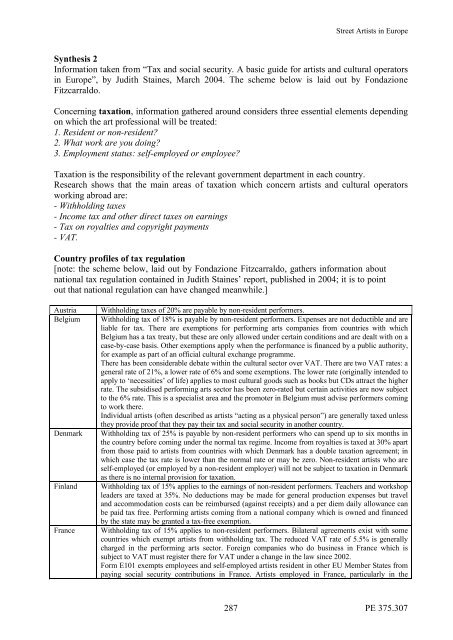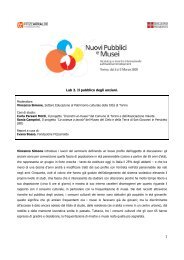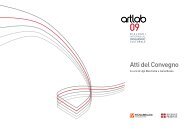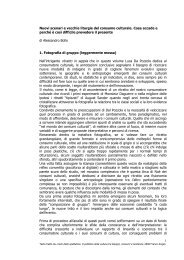STREET ARTISTS IN EUROPE - Fondazione Fitzcarraldo
STREET ARTISTS IN EUROPE - Fondazione Fitzcarraldo
STREET ARTISTS IN EUROPE - Fondazione Fitzcarraldo
Create successful ePaper yourself
Turn your PDF publications into a flip-book with our unique Google optimized e-Paper software.
Street Artists in Europe<br />
Synthesis 2<br />
Information taken from “Tax and social security. A basic guide for artists and cultural operators<br />
in Europe”, by Judith Staines, March 2004. The scheme below is laid out by <strong>Fondazione</strong><br />
<strong>Fitzcarraldo</strong>.<br />
Concerning taxation, information gathered around considers three essential elements depending<br />
on which the art professional will be treated:<br />
1. Resident or non-resident?<br />
2. What work are you doing?<br />
3. Employment status: self-employed or employee?<br />
Taxation is the responsibility of the relevant government department in each country.<br />
Research shows that the main areas of taxation which concern artists and cultural operators<br />
working abroad are:<br />
- Withholding taxes<br />
- Income tax and other direct taxes on earnings<br />
- Tax on royalties and copyright payments<br />
- VAT.<br />
Country profiles of tax regulation<br />
[note: the scheme below, laid out by <strong>Fondazione</strong> <strong>Fitzcarraldo</strong>, gathers information about<br />
national tax regulation contained in Judith Staines’ report, published in 2004; it is to point<br />
out that national regulation can have changed meanwhile.]<br />
Austria Withholding taxes of 20% are payable by non-resident performers.<br />
Belgium Withholding tax of 18% is payable by non-resident performers. Expenses are not deductible and are<br />
liable for tax. There are exemptions for performing arts companies from countries with which<br />
Belgium has a tax treaty, but these are only allowed under certain conditions and are dealt with on a<br />
case-by-case basis. Other exemptions apply when the performance is financed by a public authority,<br />
for example as part of an official cultural exchange programme.<br />
There has been considerable debate within the cultural sector over VAT. There are two VAT rates: a<br />
general rate of 21%, a lower rate of 6% and some exemptions. The lower rate (originally intended to<br />
apply to ‘necessities’ of life) applies to most cultural goods such as books but CDs attract the higher<br />
rate. The subsidised performing arts sector has been zero-rated but certain activities are now subject<br />
to the 6% rate. This is a specialist area and the promoter in Belgium must advise performers coming<br />
to work there.<br />
Individual artists (often described as artists “acting as a physical person”) are generally taxed unless<br />
they provide proof that they pay their tax and social security in another country.<br />
Denmark Withholding tax of 25% is payable by non-resident performers who can spend up to six months in<br />
the country before coming under the normal tax regime. Income from royalties is taxed at 30% apart<br />
from those paid to artists from countries with which Denmark has a double taxation agreement; in<br />
which case the tax rate is lower than the normal rate or may be zero. Non-resident artists who are<br />
self-employed (or employed by a non-resident employer) will not be subject to taxation in Denmark<br />
as there is no internal provision for taxation.<br />
Finland Withholding tax of 15% applies to the earnings of non-resident performers. Teachers and workshop<br />
leaders are taxed at 35%. No deductions may be made for general production expenses but travel<br />
and accommodation costs can be reimbursed (against receipts) and a per diem daily allowance can<br />
be paid tax free. Performing artists coming from a national company which is owned and financed<br />
by the state may be granted a tax-free exemption.<br />
France Withholding tax of 15% applies to non-resident performers. Bilateral agreements exist with some<br />
countries which exempt artists from withholding tax. The reduced VAT rate of 5.5% is generally<br />
charged in the performing arts sector. Foreign companies who do business in France which is<br />
subject to VAT must register there for VAT under a change in the law since 2002.<br />
Form E101 exempts employees and self-employed artists resident in other EU Member States from<br />
paying social security contributions in France. Artists employed in France, particularly in the<br />
287<br />
PE 375.307






